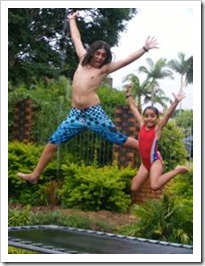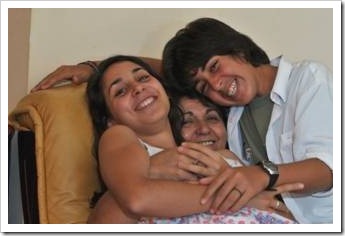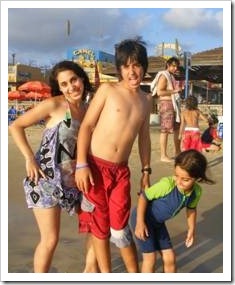
If you want your kids to have friends, you must teach them the right friendship skills and provide them with many opportunities to experience and develop those skills. So what are the social skills kids (and grownups) need?
There are 15 of them and today, I will introduce you to 8 of them.
Social Skills
Sharing
Sharing is a very early skill that starts developing as soon as your child is born. At first, babies need to share Mom with Dad (and even with siblings). When they are a bit older, they need to share some of “their” toys. At such a young age, being very self-centered, the whole world belongs to the baby and when they needs to share it with someone, we can usually hear lots of crying until their social skills are developed enough.
Still, it is important to give kids many opportunities to share and help them by offering negotiating words. “Take turns”, “You’ll get it back when she’s finished playing” and “It’s OK, the toys are staying here, so we can play with them later”.
As they grow up, kids have to start sharing space, which happens especially when they have siblings. This may continue to sharing rooms, sharing clothes and later on, sharing thoughts and feelings.
Having Manners
Having good manners means your child follows social codes, which helps others enjoy their company. Kids who say “please” and “thank you” (in the right places and without being prompted) are able to recognize the social rules and stick to them. This usually means it is safe to be around them and they are considered friendly.
Help your child learn the acceptable social behavior (manners) of the group they hang out with. Remember, some manners are universal and timeless, so start with them.
Giving Compliments
Friendly people give others lots of compliments when their talk. They are very happy with other people’s happiness and congratulate them. This signals to the others they are not jealous, so people like being with them.
People who give compliments are perceived as more confident, because others’ successes are not a threat for them. The more they compliment others (sincerely), the more friends they have. The more they sincerely compliment others, the more compliments they receive, which builds their confidence even further.
Give your kids opportunities to be around kids that are better than them and teach them to notice that jealousy destroys relationship and that compliments build relationships. Compliments are a good rapport building tool that will last your kids a lifetime.
Starting Conversations

Starting a conversation, especially with people you do not know, can be hard even for grownups, but it is amazing how many wonderful friendships started that way.
When you are in a new place, help your kids approach their new group and equip them with conversation starters, like “Can I join you?”, “Would you like to play with my ball?”, “Hi, my name is Ronit. It means ‘little happy song’. What’s your name?”
My daughter Eden was the best conversation starter in the world. When she was just 4½ years old, we moved to Texas and she did not know a word of English. In our apartment complex, there was a swimming pool and for over 3 months, every time we went there, she played with the girls in the pool for hours. When I asked her for the other girls’ names, she said, “I don’t know”. I wondered how they could play so beautifully for such a long time without her speaking a word of English and she said, “I talked to her and she understood everything”. Eden’s mingling skills were so good that by the age of 10, she started in her 8th school, but 2 days after she arrived, no one thought of her as the new girl anymore.
Winning and losing with grace
In life, your kids will win some and lose some. A good social skill to have is to win without rubbing it into the losers face and when losing, not to be a sore loser. No one likes to lose, but if you do not know how to lose gracefully, your social group will quickly shrink, because you do not respect the rules of the game.
Some kids make others feel really bad when they win and make fun of the losers. Teach your child to be humble when winning and to congratulate the winner when losing. Losing a game should not mean losing the friendship. If your kids learn this early in life, they will win wonderful friendships in times when they need friends the most.
Collaborating
Kids who take part in group efforts and do not stick out as selfish and none cooperative are much easier to be with. Collaboration requires flexibility and consideration. Being considerate is in fact the skill that underlies the collaboration effort.
Consideration means putting your thoughts, ideas, feelings and desires aside and thinking of someone else’s thoughts, ideas, feelings and desires. This is very hard thing for kids, because they are self-centered and the realizing they are not the center of the universe is not easy for them.
The first learning about collaboration starts at home with siblings and with other family member, when your child needs to consider others in order to achieve something. It is very important for parents to help their kids realize that being a happy family requires collaboration and consideration. At home, you can provide opportunities of working together like cooking or doing chores as a family. This will show your kids that life is much easier when we do things together and that being considerate to others invites others to be considerate to our needs in return.
Working in a team

The earlier kids develop this skill, the easier it will be for them in life and the more friends they will have. Even if your child prefers playing only with one friend, have special occasion when they need to “survive” a bigger group, like a playgroup, a party or a sleepover. In later years, introduce them to hobbies that require team work (basketball, football, drama, band or choir) rather than doing things on their own (like art, chess, solo instruments or running).
Helping
Friendly people are very helpful. Being helpful usually means that you can recognize that someone else has a need and you offer your support to change that. Helpful people are considered kind and everyone wants to be around kind people. The good thing about kindness is that it is contagious and others pay with kindness in return.
Teach your kids the art of recognizing that someone can benefit from their help and the art of kindness. Give them opportunities to be kind. When you have a chance, offer your help at school to show that you are kind with your own time. Encourage your kids to be kind to others by sharing food with someone who forgot his lunch or sharing pens and markets with someone who did not bring a pencil case. At dinner time, you can play a nice game of “What was your act of kindness today?” that will encourage every member of the family to do many acts of kindness.
Join me next week for the last 7 skills that you can help your child develop in order to be friendly.
Happy days,
Ronit
This post is part of the series How to Raise Friendly Kids:
- How to Raise Friendly Kids (1): What are Friends for?
- How to Raise Friendly Kids (2): Me and you together
- How to Raise Friendly Kids (3): Friends are forever
- Teach Your Kids How to Network











